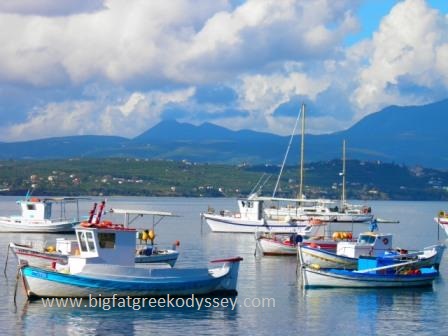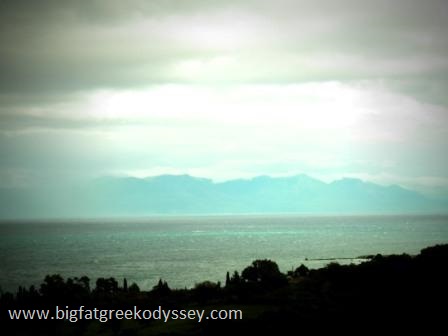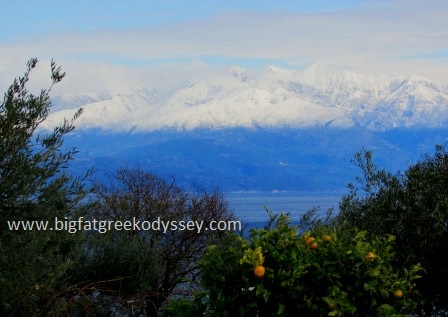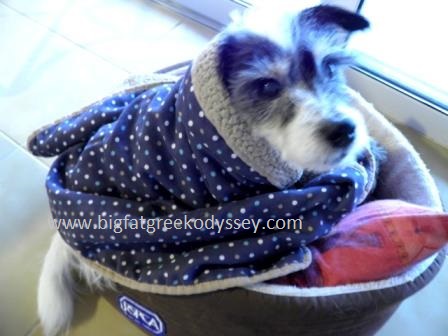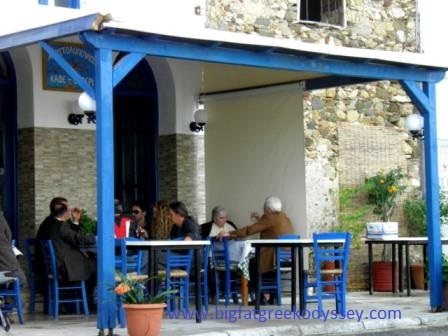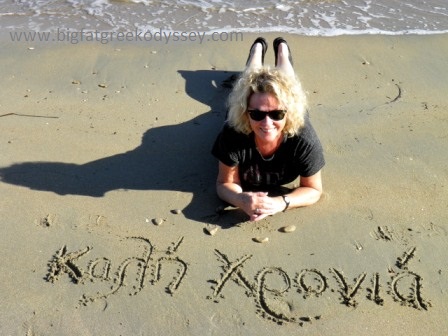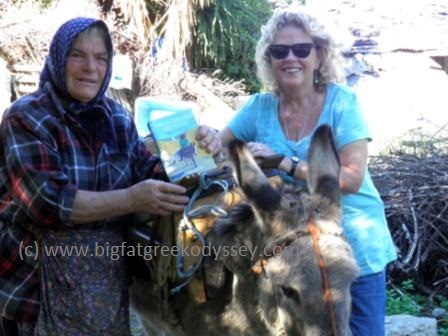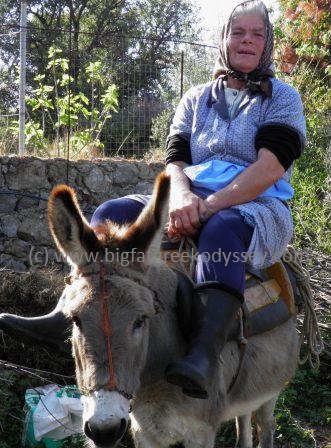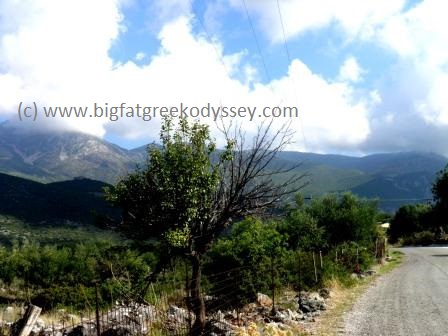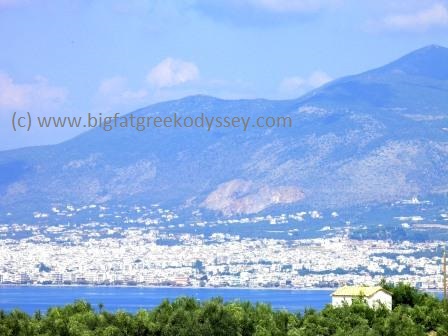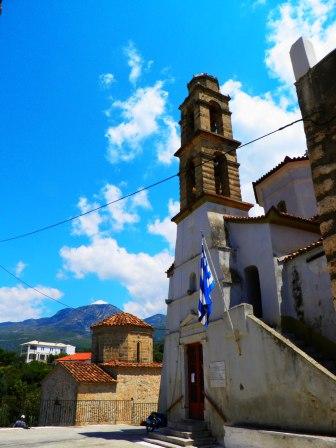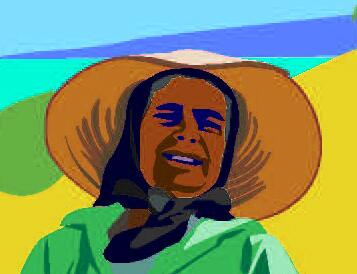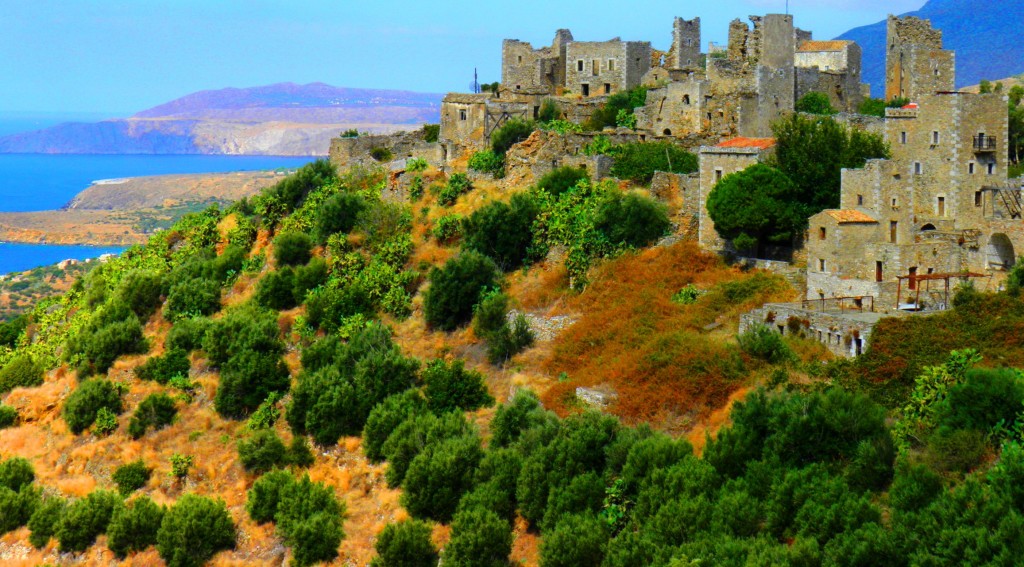MY work desk is currently a blue metal kafeneion-style table parked in front of the balcony windows. The view from here is always glorious, across the olive orchards to the Messinian Gulf, but now it’s a winter scene. Dark clouds scud over the vast expanse of water. There are snowcaps on the Taygetos mountains opposite. In the olive groves some stoical harvesters have spread their nets and are working in the rain and cold. We were swimming just a few days ago – but there will be little chance of that now as winter deepens.
Everyone adores Greece in summer – the endless hot days, the warm clear sea, the tavernas brimming with happy holidaymakers – but what’s it really like living in Greece in the winter? Well, it’s very different, of course. And while it’s hard to imagine in the punishing heat of August, it does get pretty cold in winter, especially in January and February, when an icy wind blows down from the mountains, or here in Koroni (at the tip of the Messinian peninsula), across from the Ionian Sea.
It can rain for days on end, powerful, heavy rain. A few weeks ago we had something like a mini-hurricane in Koroni, with heavy winds and hailstones. There were mudslides on the hillside where we live and stone walls collapsed along the narrow road between the olive groves. On the Mani peninsula, opposite, there was a twister one day and then a storm that caused havoc to the small villages along the coast. But by the spring, the damage will be sorted, the beachside terraces renewed and tourists will never know we even had a winter.
Some days in December there were flashes of hot weather, with the temperature around 18 to 20 degrees C, and we’ve been seized by the crazy desire to grab our swimming gear and pile down to the beach for a bracing swim. We’ve usually been the only ones there but the experience has been worth it, even swimming with the snow- capped Taygetos mountains mocking us from across the gulf.
Now it seems property winter with cooler temperatures and days of rain and even Wallace our Jack Russell has been reluctant to get out of his bed in the morning. But there are compensations too: no summer pests … mosquitoes, hornets, snakes or scorpions now, apart from the huge beige one we found one morning sitting by the front door. It put us all into a tailspin, especially Wallace, who, true to his crazy breed, wanted to bark the critter into a swift retreat, as if it were a pesky Jehovah’s Witness with a pitch fork. He gave up eventually and scarpered – Wallace that is, not the scorpion, which Jim despatched with a sweepy brush.
Koroni is a popular harbour town. In summer, the narrow streets by the harbour are thronging with holidaymakers, the waterside tavernas buzzing with life. Now the road along the paralia is almost deserted. The outside terraces have their scuffed plastic sides rolled up, the tables and chairs have gone and cars park in the spaces now – at least when it isn’t stormy and huge waves roll across the road. It’s hard to remember now what it was all like in summer. For some people, this side of Greece is much less appealing, but if you love Greece, as we do, you won’t ever be bored.
In a working town like Koroni, there are always Greeks about and they have more time to talk now. There are only one or two tavernas still open, a few old-fashioned ouzeries and several cafes, as well as regular shops. When the sun’s out, the harbour still bustles but it’s different. The locals have reclaimed their town and the atmosphere is most definitely Greek. It’s now about everyday life and having a gossip over a Greek coffee and for many of the taverna owners who have survived their seven-day working week, all summer, it’s a blessed relief to have a normal life again. But with most of our favourite haunts now shut, we’re already missing the tables set by the waterside, the plates of sizzling kalamari, slabs of moussaka and the familiar bowls of Greek salad with a doorstopper wedge of Feta on top.
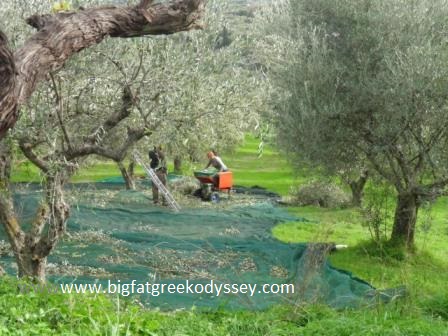
The olive harvest is a familiar and comforting scene all over the southern Peloponnese, famed for its oil
In this part of Greece, for now, all life revolves around the olive harvest, particularly with the bumper crop this year and with the higher price of oil. It has lifted morale in rural areas and brought hope where there has been little for the past five years. The roads outside the town are full of trucks stacked high with bulging sacks of olives, heading to the local presses. If you want to see how Greeks really live, winter’s the best time to be here.
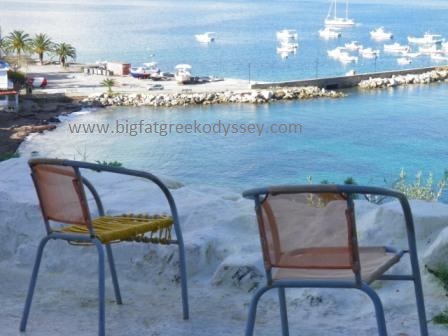
There’s plenty of winter seating for the strip of road outside the castle with its gulf view. But you might need to form an orderly queue in summer
If you look hard enough there’s still plenty to do. Even if you’re not particularly religious you can also take part in one of the many Orthodox services at this time of year, just out of sheer curiosity for its history and Byzantine ritual. A few days before Christmas we went to an intriguing service called the Iero Evhelaio, in Koroni’s main church of Ayios Dimitrios. It involved a blessing with holy oil. It was a small congregation and a long service, for which we were all given lighted candles to hold, which seemed to mark the duration of this service because by the time the candles had burnt down to waxy stubs in our fingers, it was close to the end.
It was a rather solemn service, apart from the moment when one of the chanters collapsed in a chair in a coughing fit with a case of incense overdose. Yet it felt rather Christmassy at the end when we all lined up in front of a small table, a bowl of warmed oil in the centre, and the Papas blessed each of us in turn, marking our faces and hands with small oily crosses. With good wishes from friends and neighbours, we left and wandered out into the cold night.
Some nights it’s pleasant just to go into Koroni and sit in one of the zaharoplasteia (pastry shops) and share a slab of rich, custardy galaktoboureko, for which this town is apparently famous. One Saturday night we discovered a small ouzerie by the harbour, where we had a simple meal of souvlaki, Greek salad and local wine. It’s an old building, with rickety chairs and tables, where mementoes on the walls remind you of an older, probably happier era in Greece.
The tables slowly filled up with locals, mostly drinking ouzo. One man called Andreas told us that in the past there would probably have been a few bouzouki players here and a singer or two for an impromptu night of music, but this is rarer now. But the next best thing for many Greeks on a Saturday night is the live TV music show called Cheers, Friends (Stin Iyeia Mas). Watching it is almost mandatory and in the ouzerie, a TV propped up on one wall was tuned into the show with its popular songs and vivacious bouzouki riffs, obviously delighting this assembled audience. Had we stayed to the very end I felt sure someone would eventually have got up and danced unselfconsciously around the tables. As we left, Andreas told us he played the bouzouki and he’d bring it there one night for a music session. What night, we asked? He shrugged. “When the mood takes me.” Okay, this is Greece. No rules. Take it or leave it!
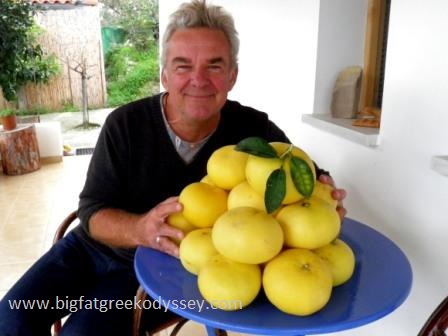
Jim is jealously guarding his crop of grapefruits, a mere fraction of what we have gathered already this winter
Winter in Greece is what you want to make it. If you don’t live here permanently, and we don’t, then you want every day to count, whatever the season. When the weather is fine we go out and explore the countryside or fuss over our new vegetable plot, with its crop of cabbages and broccoli and pick sweet winter oranges and grapefruits from the abundance of fruit trees we have around the house.
With fewer distractions in autumn and winter we have been lucky to have time to spend on projects. I have had plenty of time for writing and have finished a second book on our adventures in Greece, a task eased by an inspiring view and peaceful surroundings.
My partner Jim has been working hard on his new ebook editing and formatting business (www.ebooklover.co.uk) and twice a week he is attending government-run Greek classes in Koroni, aimed at beginners, and held in a local primary school. He’s finding it challenging since, as Greek is a hard language, but the class has not been without humour.
One night the charming teacher Panayiotis was explaining the possessive case with the sentence “to panteloni mas”, (our trousers) but one of the more advanced students was quick to correct him. “Surely it should be ta pantelonia (trousers, plural) rather than one pair?” which is what the teacher had written on the board, illustrating the fact that even Greeks can slip up sometimes.
Panayiotis covered his mistake quickly by saying: “No, this is Greece in crisis. We all have to share one pair of trousers now.” The class erupted in laughter, and even Panayiotis joined in. I doubt that anyone there will ever forget the plural for trousers at least, or the word for crisis, a Greek word after all.
Happy New Year, Kali Xronia
WE’VE had a wonderful 2014, with quite a lot of it spent in southern Greece. It hasn’t all gone to plan because, in crisis-ridden Greece, things never do. We have had our adventures, frustrations and our moments of anxiety. But every day has been blessed with new experiences and we hope that next year will be as good. Wishing all our loyal blog readers a very happy New Year and a joyous 2015. I hope many of you will spend some of your holidays at least in Greece – even in winter!
Things Can Only Get Feta
For details about my book, recounting our adventures in the Mani, and for reviews and articles, please visit our Big Fat Greek Odyssey website, book page
Visit Amazon to buy the book (Kindle version – new edition). A new edition of the paperback will also be available shortly.
If you like the book please think about leaving a review on Amazon. It will be very much appreciated.
Thanks for stopping by.
© All rights reserved. Text and photographs copyright of the authors 2016. No content/text or photographs may be copied from the blog without the prior written permission of the authors. This applies to all posts on the blog.
